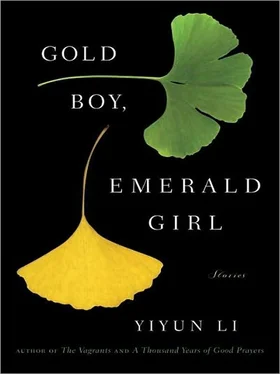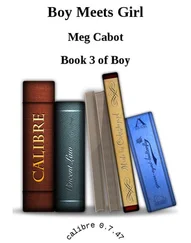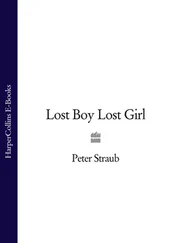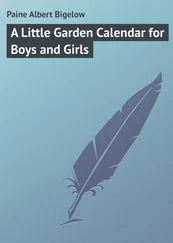A few weeks after I had come home, I was standing by the roadside and watching workers brush the trunks of elm trees with white paint mixed with pesticide when Professor Shan approached me. “I see that you’re back,” she said. “Come with me.”
I had not been to Professor Shan’s flat since I had left her, yet from the look of things, time had stopped in her world.
“I heard about your mother’s passing,” Professor Shan said and signaled me to sit down on her bed. “Is your father doing all right?”
A few days earlier my father had asked me if I thought he had been responsible for my mother’s death — would she have had a longer life if he had not married her? he asked me, and I assured him that my mother, despite her unhappiness, loved him as she never loved anyone else. My father looked at me sadly and did not speak — he must have been thinking of the married man who had never returned my mother’s love, so I showed him the bookmark I had saved from her books. What does the poem mean? he asked after reading the lines many times, and I said it was a love song from a younger woman to an older man.
“Love leaves one in debt,” Professor Shan said. I nodded, though I wondered whether she meant that my father was forever paying back his debt to my mother because of his love for her, or that being loved and unable to love back had made her indebted to him. “Best if you start free from all that, do you understand?”
I had read enough love stories to be interested in one more, I said, and Professor Shan seemed satisfied by my answer. After that I resumed my daily visit to her flat, and I continued for the next twelve years. At the beginning she read to me, and later, when her eyesight deteriorated, I took over, though she was always the one to tell me which book to read. She never asked me about my life in the army, and she showed little interest in the civilian life I’d led in college, and later as a schoolteacher. When I reached marriageable age, people began to press me, subtly at first and later less so, saying that a young woman’s best years were brief, saying that I was becoming less desirable by the day, like a fresh lychee that had not found a buyer in time. Professor Shan must have suspected all this talk but, as always, she refused to let the mundane into her flat. Instead, we read other people’s stories, more real than our own; after all, inadequate makers of our own lives, we were no match for those masters.
My father died less than a year after my mother, and against his wish I buried their urns next to each other. I visit them every year on my birthday, my only trip outside the district where I live and teach. My mother fell in love at an early age, my father late; they both fell for someone who would not return their love, yet in the end their story is the only love story I can claim, and I live as proof of that story, of one man’s offering to a woman from his meager existence, and of her returning it with her entire adult life.
I think of visiting Professor Shan’s grave in Shanghai, too, but I know I will never do it, as the location is kept from me by her children. In the last days of her life they came back from America to arrange the funeral and the sale of her flat. They were alarmed by my friendship with their mother, and before she was transferred from the geriatric ward to the morgue they told me that I was wrong if I thought they would give me a share of the inheritance.
I laughed and said that had never been my intention, though I could see they did not believe me. Why would they, when life to them was a simple transaction between those who owe and those who own? Before she entered the hospital, Professor Shan had watched me pack up her books. Take them home before my children sell them to the recycling station, she told me, and I packed them all, including the book of D. H. Lawrence’s stories that I had once stolen from her. The summer after I left the army, Lieutenant Wei had mailed it to me, along with my half-empty suitcase, with the bar of Lux soap wrapped in my civilian clothes, and a letter expressing her condolences. “I wish we had met under different circumstances,” the letter concluded.
I did not write to thank Lieutenant Wei for sending the suitcase, nor did I reply, a few months later, when she sent another letter, saying that she and the other two platoon officers had been officially invited to visit my college, and she would love to see me in my city. After that there was one more letter, and then a wedding invitation, and now, twenty years later, a funeral notice. Professor Shan would have approved of my silence, though I wonder if she was wrong to think that without love one can be free. What was not understood when I was younger is understood now. Lieutenant Wei’s persistence in seeking my friendship came from the same desire as Professor Shan’s to make me a disciple. Both women had set their hearts on making a new person, though, unlike Professor Shan, Lieutenant Wei was too curious and too respectful to be a successful hijacker of other people’s lives. Sometimes I wonder if I would have become her friend had I not met Professor Shan. Perhaps I would have subjected myself to her will as I had Professor Shan’s, and I would have become a happier person, falling in love with a suitable man, because that is what Lieutenant Wei would have considered happiness. But what is the point of talking about the past in this haphazard way? Kindness binds one to the past as obstinately as love does, and no matter what you think of Professor Shan or Lieutenant Wei, it is their kindness that makes me indebted to them. For that reason, I know Lieutenant Wei will continue coming to me in my dreams, as Professor Shan’s voice still reads to me when I sit in my flat with one of her books in hand.
I now memorize ancient poems from my mother’s books. I reread the romantic stories and never tire of them. They are terrible stories, terribly written, yet they are about fate, a kinder fate that unites one with her lover despite hardships and improbability — and they never fail to give me a momentary hope, as they must have given my mother years ago, as if all will be well in the end.
But it is Professor Shan’s collection that I truly live with, Dickens and Hardy and Lawrence, who once saw me as a young girl and who will one day see me as an old woman. The people who live out their lives in those books, like their creators, are not my people, and I wonder if it is this irrelevance that makes it easy for me to wander among them, the same way that my not being related to my parents by blood makes it easy for me to claim their love story as mine.
The girls I served with in the army must be mothers and wives by now. I imagine them continuing with their daily lives, unaware of Lieutenant Wei’s death: Ping, in a warm cocoon, once provided by her father, now by her husband; Jie, married but perhaps keeping a lover from time to time; and our squad leader, the most militant eighteen-year-old of us all, providing a warm home for her family, for even a militant girl could turn out to be a loving wife and mother. I have never forgotten any person who has come into my life. As I am on my way to work this morning, I see Nan’s face on a TV screen in a shop window. I watch her through the glass pane — I cannot hear what the program is saying, but by the way she smiles and talks, you can tell she is an important person. I study her, still petite and beautiful, still able to pass for a young woman in a choir. For a moment my heart mourns for the passing of time as it has never mourned the deaths of my parents, or Professor Shan, or Lieutenant Wei. If I close my eyes I can hear again Nan’s beautiful voice, singing “The Last Rose of Summer” at the shooting range, a random act of kindness that will continue living on in the memory of someone who is a stranger to her now.
Читать дальше
Конец ознакомительного отрывка
Купить книгу












